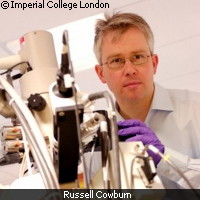Imperial researchers clinch ERC advanced investigator grants
Scientists at Imperial College London in the UK have received advanced investigator grants from the European Research Council (ERC) totalling more than EUR 7.5 million. The prestigious awards will be used by Professor Tim Coulson, Dr Serafim Kalliadasis, Professor Russell Cowburn and Professor Simon Donaldson to carry out frontier research in physics, mathematics, biology and engineering. Professor Coulson will develop and test a new theory that will help predict the consequences of environmental change on natural populations. 'I'm interested in this area because it is challenging, because it is big picture science and because it is a little contentious,' he said. 'I think it is necessary to challenge existing paradigms when they clearly are inadequate to answer a specific question. By the end of this grant, I hope to have a better understanding of the natural world than I currently do - I'm motivated by increasing understanding. We currently do not have a good feeling for how populations will respond to environmental change; I want to achieve deeper insight into its effects,' he added. Dr Kalliadasis is working on mathematical models that describe the way fluids behave when they come into contact with other fluids or with solid surfaces. 'The way in which fluids behave at interfaces and interact with solid boundaries is extremely complex,' he explained. 'Understanding it demands a synergistic approach based on a balanced combination of theory and computations at the crossroad between applied mathematics, fluid dynamics, chemical physics and stochastic processes, never attempted before in the field.' Dr Kalliadasis' models will allow him to analyse 'interfacial flows' on many levels - from the microscopic to the large scale. His findings are expected to have applications in several areas of science and technology, including the study of gravity currents under water and in lava flows, heat and mass transport processes, and many engineering endeavours. 'Ultimately, we hope that our models will greatly assist researchers and engineers involved in controlling and optimising processes and devices, ranging from microfluidics, which looks at fluids constrained in micrometre-scale spaces, to biological settings, for example the problems of microprinting and of directing biological cell populations along ridges of liquids,' Dr Kalliadasis stated. Professor Russell Cowburn will use his grant to study spintronics (the science of harnessing the spin of electrons to store, process and receive information), with the goal of developing new microchips that can store thousands of times more data than is currently possible. Data is stored in microchips in active components that lie on the surface of the silicon chips; the new chips will hold many active components stacked on top of each other. 'I am very excited about this grant, as it takes us from researching a new kind of fundamental physics to potential commercialisation of the end product. We're essentially starting with a physics that hasn't even been discovered yet and ending up with something that could be used in your iPod,' said Professor Cowburn. Professor Donaldson is examining complex mathematical problems linked to string theory (a theory in particle physics that postulates that subatomic particles are one-dimensional strings) and Einstein's theory of General Relativity. His grant will also be used to support two PhD students and two postdoctoral researchers. He will use complex numbers in algebraic equations to describe high-dimensional shapes (much as a circle can be described by an equation), and will tackle equations whose solutions have evaded mathematicians for decades. 'With the grant I hope to prove there are solutions to these partial differential equations,' he said. 'The grant will do even more than that - it will enable us to attract some bright young people to train and work with us at Imperial. We hope we will interest some of the best young mathematicians from around the world.' The ERC, a pioneering component of the Seventh Framework Programme (FP7) financed through the Ideas specific programme, has a total budget of EUR 7.5 billion until 2013. Its goal is to support and encourage 'the best creative scientists, scholars and engineers of any nationality in any field of research' to work in European institutions. The advanced grants support top senior scientists while younger, emerging research leaders can be awarded with starting grants. The ERC has provided support to more than 900 projects since its inception in 2007.
Countries
United Kingdom



